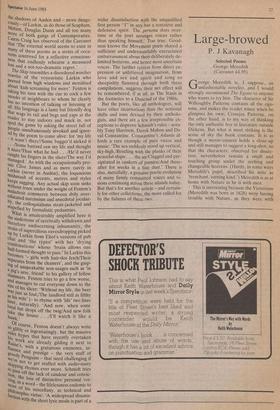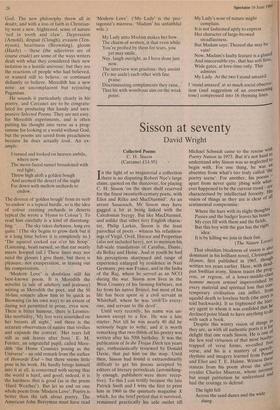Large-browed
P. J Kavanagh Selected Poems George Meredith (Carcanet £4.95) George Meredith is, I suppose, an unfashionable novelist, and I would strongly recommend The Egoist to anyone who wants to try him. The character of Sir Willoughby Patterne contains all the ego- isms, and makes the reader wince when he glimpses his own; Crossjay Patterne, on the other hand, is to my way of thinking the only authentic boy in literature outside Dickens. But what is most striking is the sense of sky the book contains. It is as though a movie-camera holds a close-up and still manages to suggest a long-shot, so that the characters, observed for dissec- tion, nevertheless remain a small and touching group under the arching and changeable heavens. (Hardy, in some ways Meredith's pupil, described his note as `trenchant, turning kind.') Meredith is as at home with Nature as he is with men.
This is interesting because the Victorians (Meredith was born in 1828) were having trouble with Nature, as they were with God. The new philosophy threw all in doubt, and with a loss of faith in Christian- ity went a new, frightened, sense of nature `red in tooth and claw'. Depression (Arnold), despair (Clough), evasion (Ten- nyson), heartiness (Browning), gloom (Hardy) — these (the adjectives are of course crude) are some of the ways writers dealt with what they considered their new isolation in a hostile universe; but they'are the reactions of people who had believed, or wanted still to believe, or continued defiantly to believe. Meredith has a new note: an uncomplacent but rejoicing Paganism.
He sounds it particularly clearly in his poetry, and Carcanet are to be congratu- lated for producing this handy and inex- pensive Selected Poems. They are not easy, for Meredith experiments, and is often putting his thought into verse as a prog- ramme for looking at a world without God; but the poems are saved from preachiness because he does actually look. An ex- ample: I turned and looked on heaven awhile, where now
The moor-faced sunset broadened with red light; Threw high aloft a golden bough And seemed the desert of the night Far down with mellow orchards to endow.
The divorce of 'golden bough' from its verb `to endow' is a typical hurdle, so is the idea of colour creating orchards in deserts typical (he wrote a 'Hymn to Colour'). To read him carefully is a kind of disentang- ling: '. . . The sky takes darkness, long ere quite.' (The sky begins to grow dark but it is a long time before it is completely so.) The squirrel cocked ear o'er his hoop'. (Listening, head turned, so that ear nearly meets hooped tail.) These lines may not need the glosses I give them, but there is pleasure, not exasperation, in teasing out his compressions.
`Modern Love' is doubtless still his best-known poem. It is Meredith the novelist (a tale of adultery and jealousy) writing as Meredith the poet, and the 50 16-line sonnets allow him to be quick as Browning (in his own way) to an extent of daring not permitted in prose, even now. There is bitter humour, there is Leontes- like morbidity, 'My feet were nourished on her breasts all night,' and there is the accurate observation of nature that vivifies and expands the context: 'Her tears fall still as oak leaves after frost.' E. M. Forster, an ungrateful pupil, called Mere- dith 'the Home Counties posing as the Universe' — an odd remark from the author of Howards End — but there seems little pose in his work. He hardly brings himself into it at all, is concerned with saying that the world is hard, and good; indeed, it is the hardness that is good (as in the poem `Hard Weather'). But let us end on one whole poem from 'Modern Love'. Poetry is better than the talk about poetry. The American John Berryman must have read
`Modern Love'. (`My Lady' is the pro- tagonist's mistress, 'Madam' his unfaithful wife.) My Lady unto Madam makes her bow. The charm of women, is that even while You're probed by them for tears, you yet may smile,
Nay, laugh outright, as I have done just now.
The interview was gracious: they anoint (To me aside) each other with fine praise: Discriminating compliments they raise, That hit with wondrous aim on the weak point: My Lady's nose of nature might complain.
It is not fashioned aptly to express Her character of large-browed steadfastness.
But Madam says: Thereof she may be vain!
Now, Madam's faulty feature is a glazed And inaccessible eye, that has soft fires, Wide gates, at love-time only. This admires My Lady. At the two I stand amazed.
I 'stand amazed' at so much social observa- tion (and suggestion of an overweening tone) compressed into 16 rhyming lines.













































 Previous page
Previous page